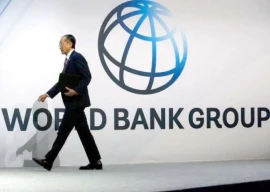
The National Electric Power Regulatory Authority (Nepra) has allowed the Karachi Electric Supply Company (KESC) to increase the electricity tariff by 53 paisa per unit for February 2011.
The increase, as a result of the monthly fuel adjustment charges, will not be applicable to consumers of up to 50 units per month. Nepra had last announced an increase of Rs0.58 per unit in October 2010.
KESC General Manager Media Aminur Rehman declined to give any details on the tariff hike. “It is Nepra that has increased the tariff, so there is no comment from our side,” he said.
A well-placed KESC official told The Express Tribune that KESC has a strict policy to not share such information with anyone, particularly the media.
The official, requesting anonymity, said the tariff increase would put an additional burden of around Rs110 per month on residential consumers with an average monthly consumption of 200 units. He added that the impact of the tariff hike will be greater for commercial and industrial consumers, due to higher consumption compared with residential consumers.
Speaking about the recent increase in power outages, as a result of reduced gas supply, the official said it was possible to bridge the electricity demand-supply gap by generating power through furnace oil. He, however, added that such an act would lead to further increases in power tariff due to spiralling prices of furnace oil in the international market.
Many consumers have complained about KESC’s schedule for power outages, claiming that the duration of outages has roughly been the same, with or without the shortage of gas.
The duration has gone up to 12 hours in residential areas in the city, while industrial zones are experiencing power cuts of a minimum eight hours. The power crisis has led to protests in several localities of the city, while also creating an acute shortage of water, as residents are unable to extract water from lines without electricity.
When questioned about production capacity, the official informed that KESC has an overall generation capacity of around 1,800 megawatts, adding that production was not in line with the capacity due to inefficiency and gas shortages.
He added that KESC should begin purchase of electricity from independent power producers (IPPs). KESC is discouraged to buy power from IPPs due to comparatively higher rates.
PSO to increase furnace oil supply
KESC informed that the Sindh governor has assured that Pakistan State Oil (PSO) would supply additional furnace oil to the power utility. The company welcomed the increase from 33,000 tons to 80,000 tons.
This decision will be in force till April 30, which will help the utility serve the population better by supplying electricity at affordable rates.
The Sindh governor assured PSO on behalf of the federal government that the price differential amount in respect to current supplies would be released at an early date by the Ministry of Finance. He also assured PSO of release of the outstanding amount of Rs3.9 billion, in respect of supplies made to KESC during the previous financial year, under the Gas Load Management Plan (GLMP).
KESC was informed that PSO will issue invoices at full furnace oil price till instructions in this regard are issued by the Ministry of Finance. KESC is likely to begin receiving oil on Saturday and it will start to normalise the power situation in the city.
Published in The Express Tribune, April 16th, 2011.



1722415155-0/BeFunky-collage-(18)1722415155-0-165x106.webp)
1717051338-0/BeFunky-collage-(76)1717051338-0-165x106.webp)





1730379446-0/WhatsApp-Image-2024-10-31-at-17-56-13-(1)1730379446-0-270x192.webp)






COMMENTS
Comments are moderated and generally will be posted if they are on-topic and not abusive.
For more information, please see our Comments FAQ